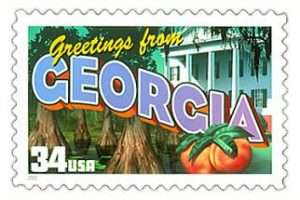MGM Continues to Court Atlanta, Georgia
As a resident of the state of Georgia for the last 17-plus years, I can tell you that casino gambling is nowhere close to happening. However, for those that would like to avoid driving hours out of state to take part in a little gambling entertainment, the past year has at least been mildly encouraging. Georgia, a Bible Belt state with just the lottery as its only form of legalized gambling, has seen the possibility of casinos discussed by state legislators and even a bill (which went nowhere) put forward. The interest is apparently strong enough that last week, the CEO of MGM Resorts International made his second presentation for a $1 billion Atlanta casino.
 MGM president and CEO Jim Murren spoke to the Rotary Club of Atlanta last Monday, pitching a $1.4 billion “integrated resort” complete with casino, concert hall, hotel, shopping, and dining. He called Atlanta a “tremendously appealing market,” saying the resort would create 4,000 jobs (once it’s finished – more workers, of course, would be employed to build the project).
MGM president and CEO Jim Murren spoke to the Rotary Club of Atlanta last Monday, pitching a $1.4 billion “integrated resort” complete with casino, concert hall, hotel, shopping, and dining. He called Atlanta a “tremendously appealing market,” saying the resort would create 4,000 jobs (once it’s finished – more workers, of course, would be employed to build the project).
As reported by the Atlanta Journal-Constitution, Murren said, “We only go into markets where we believe we can provide a destination addition to a market. We’re interested in the type of resorts that provide a nexus between entertainment, hospitality and gaming.”
Though Georgia has no casinos, the reason more and more people, including state legislators, are becoming interested in the idea is to help fund the HOPE Scholarship program. Currently, the HOPE Scholarship, as well as the state’s public pre-K (pre-kindergarten) program is entirely funded by the state lottery. The HOPE Scholarship has been extremely successful, but the problem is that so many students are qualifying and applying for it that available funds are dwindling. Expanded gambling could help.
There are pages of rules and regulations, but in short, to qualify for a HOPE Scholarship, high school students must have a 3.0 grade point average. They must maintain at least a 3.0 to continue receiving the scholarship once in college. Students must attend an in-state school (public or private) to earn HOPE funds.
To slow the outflow of money, the HOPE Scholarship stopped paying for books and mandatory fees in 2011. In addition, new “academic rigor” standards were put into place in 2015, requiring students to take more difficult classes to qualify. Obviously, the idea here is to reduce the number of eligible students.
The HOPE Scholarship does not pay for all of a student’s tuition, but the assistance is certainly welcomed. For example, a student who takes 15 credits this semester at the University of Georgia will receive $3,495. Tuition and fees, according to UGA’s website, amount to $5,817 this semester. Total expenses for the semester are estimated at $13,104.
A bill that would legalize casino gambling, HB 677, was introduced last year but never really made any progress. It would have authorized as many as six “destination casinos” in five outlined state regions. The Atlanta metro area would be Region 1 and could have two casinos. The licensing fee for the “primary” casino would be $25 million, while the fee for the other five in the state would be $10 million each. They would have been taxed 12 percent of their gross gaming revenue, most of which would go to the HOPE Scholarship program.
Local business group Central Atlanta Progress recently commission a study that concluded that a casino would cannibalize Atlanta entertainment dollars. Thus, many business leaders at the Rotary Club meeting expressed their concern about a billion dollar casino siphoning off their customers. The Fox Theater, for instance, is a revered venue for music, comedy, and theater performances (this writer, for example, saw Bill Cosby there when he wasn’t hated and saw “Book of Mormon” at the Fox this year). The Fox Theater’s president and CEO Allan Vella expressed his concern to Murren that an MGM casino would be able to pay more for concert acts, thus leaving the Fox in the lurch.
According to the AJC, Murren told him that “his company funds many nonprofit arts groups and that landmarks such as the Fox will ‘find us to be a great ally not an adversary.’”
David Marvin, CEO of Legacy Ventures, a company that owns restaurants and hotels downtown, thinks a casino outside of Atlanta could potentially work. Murren would prefer one near the airport and convention venues so that visitors to the city could more easily get to the casino.
As one would naturally expect, members of the religious community aren’t particularly thrilled with the idea of legalized gambling. Mike Griffin, public affairs representative for the Georgia Baptist Mission Board, thinks the HOPE Scholarship excuse is a load of horse hockey.
“I think one of the most egregious things I hear in all of this is that it’s all for the children,” he told the AJC.



















COMMENTS